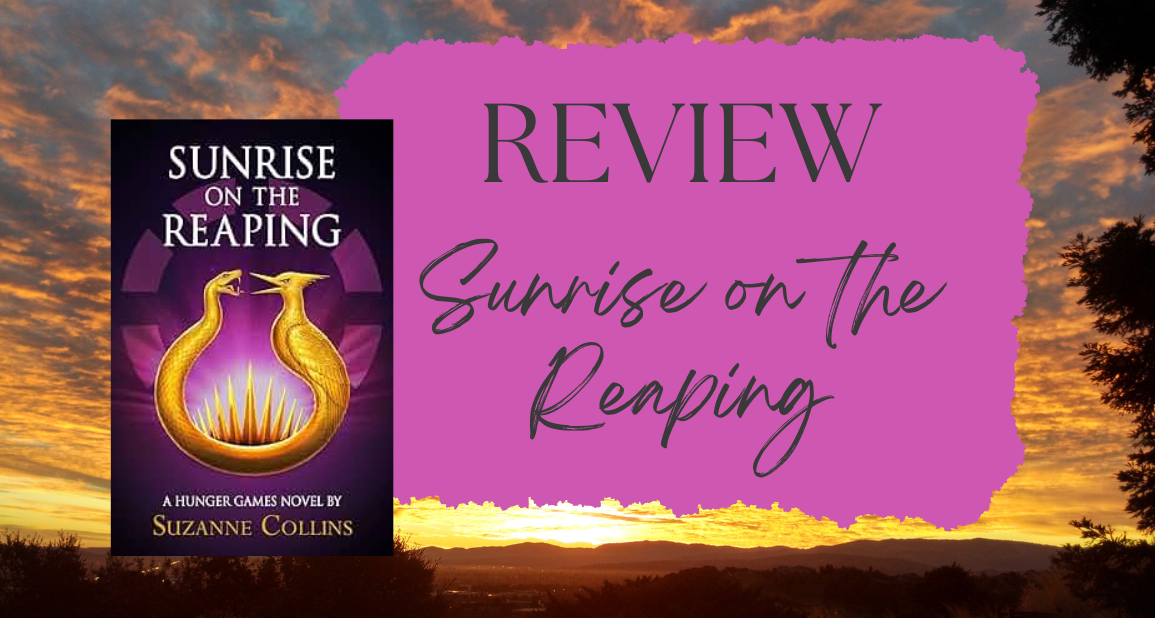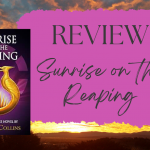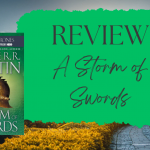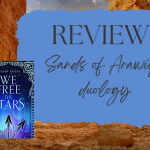Review | Sunrise on the Reaping (prequel)
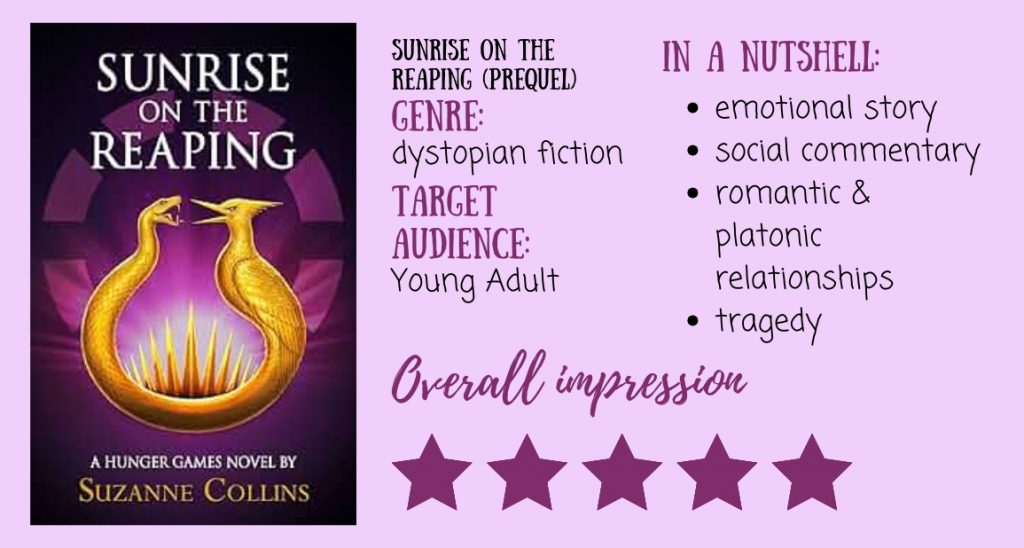
What is this book about?*
As the day dawns on the fiftieth annual Hunger Games, fear grips the districts of Panem. This year, in honor of the Quarter Quell, twice as many tributes will be taken from their homes.
Back in District 12, Haymitch Abernathy is trying not to think too hard about his chances. All he cares about is making it through the day and being with the girl he loves.
When Haymitch’s name is called, he can feel all his dreams break. He’s torn from his family and his love, shuttled to the Capitol with the three other District 12 tributes: a young friend who’s nearly a sister to him, a compulsive oddsmaker, and the most stuck-up girl in town. As the Games begin, Haymitch understands he’s been set up to fail. But there’s something in him that wants to fight… and have that fight reverberate far beyond the deadly arena.
*official blurb of the book
NOTE:
This review is spoiler-free and does not contain spoilers for any of the other four books in the series either. However, I do highly recommend you read the books in publishing order since Sunrise on the Reaping is closely linked to the story of the pre-existing books. Some parts of the review might be difficult to understand without any previous knowledge about the rest of the books. In case you do still want to read the review and anything is unclear, feel free to leave a comment, I would gladly clarify any point I made.
Review:
Suzanne Collins has done it again and delivered a masterpiece! I had high expectations going into this book, not only to experience an interesting tale about one of the fan favourites, but also to read a thought-provoking social critique and of course to be emotionally invested in the characters’ journeys. The book delivered on all these accounts and even surpassed my expectations. The Hunger Games has long been my favourite book in the series, ever since I first read it as a 13-year-old back in 2018… but I am afraid Sunrise on the Reaping has dethroned it.
Sunrise on the Reaping is an excellent exploration of propaganda and the role of public opinion in the Hunger Games universe, and a powerful analogy to the real world. Collins’ books have always been political at heart, questioning, criticising, reflecting on real world problems. Suzanne Collins writes her books when she has something to say and that translates directly into the impact her stories have. While fans have been demanding to see Haymitch’s story for years, Sunrise on the Reaping is not the “exciting” story of the “most spectacular games” in the history of Panem. It is a look behind the scenes of the Hunger Games, how they are manipulated in favour of the Capitol and the story they are trying to tell. It questions what we thought we knew, both about Haymitch and his Games. For those of you who have read the original trilogy, you might remember the scene in Catching Fire where Katniss watches the summary of Haymitch’s Games (a scene that was not featured in the movies). For a long time, I believed this scene disqualified Haymitch’s story for a prequel: we already knew what happened, after all. Suzanne Collins proved me wrong with a clever twist. We knew from Katniss’ own Games that the Capitol manipulated the footage to cut scenes that might inspire rebellion or paint the Capitol in a bad light, but with Sunrise on the Reaping, Suzanne Collins explored how far-reaching the manipulation of facts in Panem is, how she can write an entire book about a story we think we know, and prove how deceiving appearances can be. With recent developments, especially considering the increased use of AI to create or manipulate photos and videos, the warning to not blindly trust what we are shown, and to explore the effects of such manipulations, is incredibly relevant. As usual, Suzanne Collins manages to effortlessly weave all of this into a powerful story.
I have always believed that fiction is the most powerful tool we have at our hands to explore the world we live in. It allows us to see the world from a different perspective, to step into the shoes of those characters and temporarily live in their world. While our view on the real world is inevitably tainted by our own experiences, diving into a fictional world allows us to see issues we are confronted with in real life in a different context, or rather in different contexts, since similar issues are often explored in many different books. I believe that a lot of people try to deny the inherent political character of books because within the context of the book, they were confronted with ideas or truths that do not align with what they want to believe the world is like in the context of their own lives, so they try to deny any link between the two. Nevertheless, the sole fact that books are being banned around the world, and have been all throughout history, is proof how powerful they are and that their impact extends far beyond the fictional context of the story. I hope Sunrise on the Reaping will invite people to reflect on what is happening in the world right now and how what we learned from Haymitch’s (but also Katniss’ or even Snow’s story since the same applies to the four other books in the series) can help us understand the world we live in.
While The Ballad of Songbirds and Snakes was a more philosophical prequel, Sunrise on the Reaping more closely mirrors the style of the original trilogy, delivering a very emotional story. I personally found The Ballad of Songbirds and Snakes brilliant, but I know many people had difficulties connecting to the story in the same way they did to the original trilogy since the tone was more detached and it was harder to form an emotional connection with the characters. Sunrise on the Reaping, on the other hand, is a very emotional story and relies heavily on the connection we form with the characters. Despite only knowing some characters for very few scenes, Suzanne Collins managed to make me care about them and I cried several times throughout the book when, inevitably, tragedy struck and my favourite characters died. Haymitch’s story is very tragic and it was hard to read about all the suffering these people (mainly children…) had to go through. It is one of the main strengths of the book, in my opinion. The story felt so real and despite knowing the principle of the Games and that there was only to be one victor, I could not help but feel devastated every time another one of these children died. In the previous paragraph, I mentioned how I believe fiction to be a powerful tool to explore our world. One important part in this is how we care about the characters we read about, how they are real to us even if they are only words on paper. This is not the story of a whole country, it is the fate of one single character and those around him, making the story very personal. By making us care for these characters and showing us the tragedy that befell them, we feel sadness and anger on their behalf. At the same time, we also experience their hope and dreams for the future. It makes the story real to us, it makes the story stay with us long after we read the final page, it makes Sunrise on the Reaping so powerful.
For me, the way the story was crafted hit very close to home. I loved reading the different interactions between the characters and was very moved by the way they all cared for one another, despite being put into impossible situations. I was heartbroken every time another relationship came to an abrupt end because one of the characters died. Collins did a great job humanising the characters, showing how in the end, most people in Panem are victims, which does not mean that other actions of theirs can be excused. While Haymitch’s perspective limits what we get to see and we are inevitable biased due to being in his head, that does not mean the other characters are portrayed as one-dimensional. For the relatively short amount of time we spend with each individual character, they are astoundingly fleshed out and Collins does not neglect to remind us who “the real enemy is”.
One particular thing I love about her books is how she manages to balance all the different relationships in it. A central part of the story is Haymitch’s love for Lenore Dove, his girlfriend. It does not take over the story however, leaving enough room for his friendship with the other tributes and people from home, his love for his family, and companionship with different people who accompany him on his journey. In my opinion, platonic relationships are too often neglected in fiction, with many books focusing on romantic love. It is a breath of fresh air to see how Suzanne Collins shows us that both are equally valuable.
Sunrise on the Reaping is a valuable addition to the Hunger Games series, closing the gap between Ballad of Songbirds and Snakes and the original trilogy. It manages to weave together the past and the future, connecting the dots and adding more depth to the characters we already know and love. I loved the guest appearances of some fan favourites, which were skillfully integrated into the story and added some moments of excitement.
The following paragraph contains some vague spoilers about the general arc of the original trilogy (spoiling important developments but no specifics). In case you have not read it yet, I recommend you skip the paragraph.
While there is still plenty of space for future books in the Hunger Games universe, should Suzanne Collins plan to write more, I felt as though Sunrise on the Reaping beautifully completed an arc that shows how the Hunger Games evolved from the beginning until their end, illustrating how it was a lengthy struggle and contextualising what we perceived as a relatively rapid successful rebellion in the original trilogy. Sunrise in the Reaping is tragic because we know how it ends, but that does not mean that there is no hope in it.
Overall, I wholeheartedly recommend this book to every fan of the Hunger Games. I am truly convinced that it is one of Suzanne Collins’ finest works in how it is both straight to the point and extremely rich in depth and detail.
Feel free to share your opinion on the book in the comments. I would love to hear what you think about it and whether you liked it!
Please remember to keep the comments spoiler-free or add a Spoiler Alert beforehand so everyone has the opportunity to enjoy the reading experience without already knowing everything that happens.
